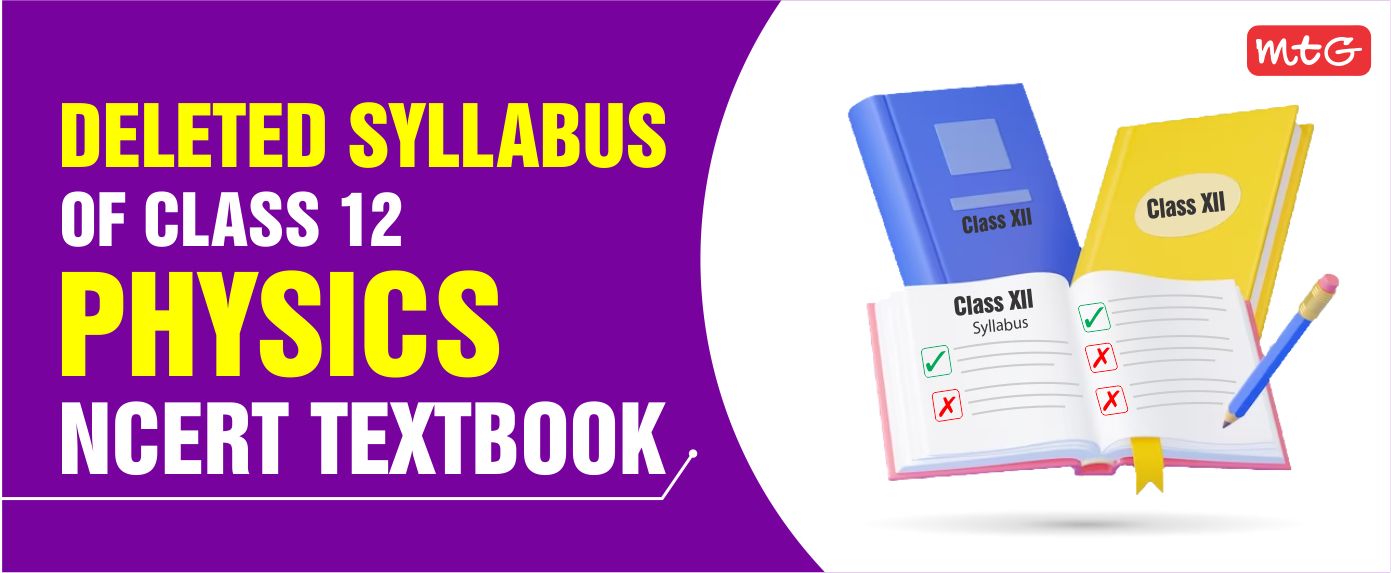
NCERT has significantly updated the Physics textbooks in accordance with the National Education Policy (NEP) in 2020 to provide students with a more contemporary and engaging learning experience. “The reduction in the material will help in increased curriculum flexibility and the renewed emphasis on productivity rather than rote learning,” claims NEP 2020. The new curriculum has been designed to ease the workload and pressure on the students and promote more practical and experiential learning. Source – NEP Final
The NCERT Physics textbooks will be available in at least 22 languages, mentioned in the eighth schedule of the Constitution, including Hindi, English, Bengali, Assamese, Gujarati, Kannada, Sanskrit, Punjabi, Sindhi, Manipuri, Urdu, Malayalam, Odiya, and Kashmiri, among others.
Also Check – Deleted Syllabus of Class 12 (2023-24) From NCERT Textbooks
Topics Removed from the Revised Textbooks
Following the implementation of the NEP 2020 policy, around 30% of the content of the NCERT Physics textbook is likely to be rationalised for 2024-2025. MTG consists of a team of experienced authors and subject matter experts who are well-versed with the latest developments in their respective fields. We strive to provide resources that are up-to-date and provide students with the necessary knowledge to succeed in their academic pursuits. We are quick to adapt in regards to the latest revision of the NCERT Physics textbook and will soon include changes consistent with the NCERT on our CBSE Books for Class 12. The table below lists the content that has been dropped from NCERT Physics for class 12 for the academic year 2024–2025.
| Class-12 NCERT Chapter | Dropped Physics Topics/Chapters |
|---|---|
| Chapter 1: Electric Charges and Fields | 1.2 Electric Charge (delete only activity with paper strips and making electroscope); 1.3 Conductors and Insulators (delete only concept of earthing); 1.4 Charging by Induction; Exercises 1.13, 1.25–1.34 |
| Chapter 2: Electrostatic Potential and Capacitance | 2.15 Energy Stored in a Capacitor (delete only derivation); Exercises 2.12 to 2.36 |
| Chapter 3: Current Electricity | 3.7 Resistivity of Various Materials (delete Tables 3.1 and 3.2 and Carbon resistors, Colour code for carbon resistor) 3.10 Combinations of Resistors – Series and Parallel; Example 3.5; 3.15 Meter Bridge; 3.16 Potentiometer; Exercises 3.3, 3.4, 3.10, 3.12, 3.14–3.23 |
| Chapter 4: Moving Charges and Magnetism | Table 4.1; 4.4.1 Velocity Selector; 4.4.2 Cyclotron; 4.8.2 The Toroid; 4.10.3 The Magnetic Dipole Moment of a Revolving Electron; Exercises 4.14–4.28 |
| Chapter 5: Magnetism and Matter | 5.2.2 Bar Magnet as an Equivalent Solenoid (delete only mathematical treatment); 5.2.3 The Dipole in a Uniform Magnetic Field (delete only mathematical treatment); Example 5.4; 5.4 Earth’s Magnetism; 5.41. Magnetic Declination and Dip Table 5.2; 5.6.2 Paramagnetism (delete only Curie’s Law); 5.6.3 Ferromagnetism (delete only Curie’s temperature; and Hysteresis); 5.7 Permanent Magnets and Electromagnets; Exercises 5.1, 5.2, 5.9–5.11, 5.13–5.25 |
| Chapter 6: Electromagnetic Induction | 6.7 Energy Consideration: A Quantitative Study; 6.8 Eddy Currents; Exercises 6.6, 6.10-6.17 |
| Chapter 7: Alternating Current | Figure 7.7 Magnetisation and Demagnetisation of an Inductor; Figure 7.10 Charging and Discharging of a Capacitor 7.6.2 Analytical Solution (of series LCR circuit); 7.6.3 Resonance (delete only Sharpness of Resonance); 7.8 LC Oscillations Exercises 7.6, 7.8, 7.10, 7.12–7.26 |
| Chapter 8: Electromagnetic Waves | Example 8.1; 8.3.2 Nature of Electromagnetic Waves (delete only about ether and page 277); Example 8.4 and 8.5; Exercises 8.11–8.15 |
| Chapter 9: Ray Optics and Optical Instruments | 9.3 Refraction (delete only advanced sunrise and delayed sunset); 9.4.1(i) Mirage; 9.4.1(ii) Diamond; 9.7 Some Natural Phenomena due to Sunlight; 9.7.1 The Rainbow; 9.7.2 Scattering of Light; Exercise 9.18 |
| Chapter 10: Wave Optics | 10.3.4 Doppler Effect; Example 10.1; 10.5 Interference of Light Waves and Young’s Experiment (retain the final expressions for dark and bright fringes but delete the derivation; delete expression for fringe width); 10.6 Diffraction (retain only qualitative treatment); 10.6.3 Resolving Power of Optical Instruments; 10.6.4 Validity of Ray Optics; 10.7.1 Polarisation by Scattering; 10.7.2 Polarisation by Reflection; Exercises 10.7–10.21 |
| Chapter 11: Dual Nature of Radiation and Matter | Table 11.1; Example 11.3; 11.8 Wave Nature of Matter (delete only derivation for de Broglie wavelength of accelerated electron; and Heisenberg’s uncertainty principle); 11.9 Davisson and Germer Experiment; Appendix 11.1 The History of Wave-Particle Flip-Flop; Exercises 11.5, 11.7, 11.12 to 11.14, 11.16, 11.17, 11.19–11.37 |
| Chapter 12: Atoms | 12.3.1 Spectral Series; 12.4 Bohr Model of the Hydrogen Atom (retain only the expression for radius of nth possible orbit but delete its derivation); 12.5 The Line Spectra of the Hydrogen Atom (retain only qualitative treatment); Example 12.6 Exercises 12.3,12.11–12.17 |
| Chapter 13: Nuclei | 13.6.1 Law of Radioactive Decay; 13.6.2 Alpha Decay; 13.6.3 Beta Decay; 13.6.4 Gamma Decay; 13.7.2 Nuclear Reactor Exercises 13.1, 13.2, 13.6–13.10, 13.12–13.14, 13.18, 13.22–13.31 |
| Chapter 14: Semiconductor Electronics: Material Devices and Simple Circuits | 14.8 Special Purpose p-n junction Diodes; 14.9 Digital Electronics and Logic Gates; Exercises 14.7–14.15 |
What is the basis of Content Rationalisation?
According to Union Minister of State for Education Annapurna Devi, “Overlapping with similar content included in other subject areas in the same class; similar content included in the lower or higher class in the same subject; difficulty level; content, which is easily accessible to children and does not require much intervention from the teachers and can be learned through self-learning or peer learning; content, which is not relevant in the present context or outdated and taking care of the learning outcomes already developed across the classes, are among the criteria adopted for rationalization of the content load.” Source – NCERT textbooks rationalised to compensate for Covid-19 time loss: Education ministry
Check out – How to Prepare for Physics Class 12 – Tips to Score 100% in your Exam
MTG is reputed for staying up-to-date with the latest trends and policies in education. We always make sure to come up with learning material that will help students to ace all the challenges they might face in their educations. You can trust us for 100% error-free and authentic content to achieve your dreams.
Follow us for all the educational updates!






























